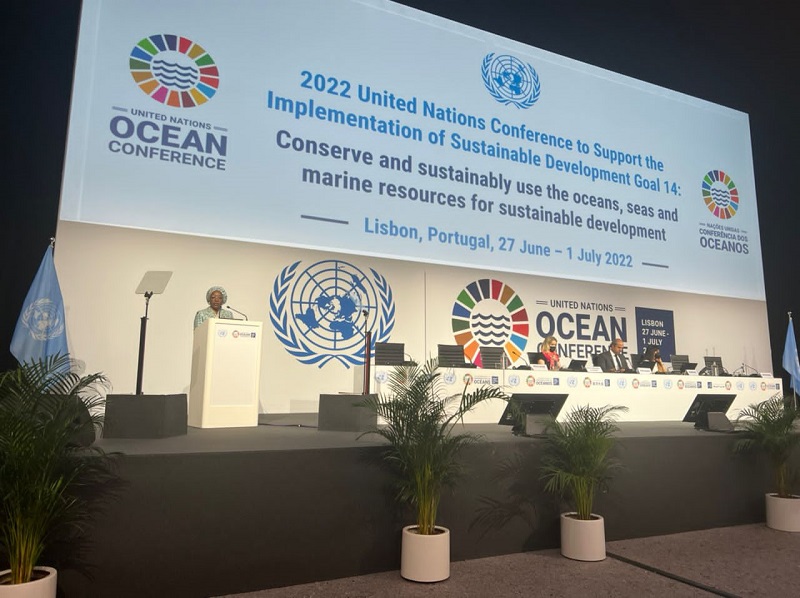Delivering the Nigerian National Statement at the Second UN Oceans Conference in Lisbon, Portugal on Monday, June 27, 2022, Environment Minister of State, Sharon Ikeazor, stated that, by creating Marine Protected Areas, formulating Policies on Plastic Pollution and National Solid Waste Management, and establishing a National Roadmap on Solid and Plastic Waste Management, the nation has shown its commitment towards ensuring the health and sustainability of our oceans

It is an honour for me to speak on behalf of my President, HE Mohammadu Buhari. Nigeria congratulates and thanks the Governments of Portugal and Kenya for co-hosting this important conference.
The entire Southern border of Nigeria is the Atlantic Ocean with a coastline of about 853km being the longest in the West African region. It is endowed with enormous biodiversity resources such as the freshwater and mangrove forest ecosystems with diverse species of fauna and flora.
We acknowledge the fact that a healthy ocean and coastal environment is key to sustainable development. We must therefore conserve and sustainably use the oceans, seas and marine resources.
The ocean is key to the global economy, with an estimated 40 million people projected to be employed by ocean-based industries by 2030. Our oceans and seas are repositories of tremendous wealth, in terms of natural capital, ecosystem services, living and non-living resources. We are conscious of the fact that our maritime and aquatic resources are critical for the livelihoods of our people. Hence, our commitment to the Africa Union 2063 Agenda and the attainment of United Nations SDG 14.
We commend the United Nations for leading the process towards ensuring effective ocean governance. This is evident in the outcome of UNEA 5.2 resolution 14 on the establishment of an Open-ended Working Group to prepare for the work of the Intergovernmental negotiating committee on international legally binding instrument on plastic pollution, including marine environment. I urge all Member States to give support to this process.
As a maritime country, we prioritise SDG 14 and commit to ensuring the health and sustainability of our oceans. In this regard we have:
- Embarked on the creation of two Marine Protected Areas;
- Formulated National Policy on Plastic Pollution to address the menace of Marine Plastic pollution from land-based sources and activities;
- Formulated a National Solid Waste Management Policy; and
- Established a National Roadmap on Solid and Plastic Waste Management.
In mainstreaming ocean into our economy, we have set a vision 2050 and Medium-Term Development Plan with the Ocean being an integral part of it. To realise the Blue Economy potential of Nigeria, a Presidential Committee on Sustainable Blue Economy has been constituted.
We are committed to oceans related multilateral agreements and are fully involved in all the ongoing processes/negotiations, including the international legally binding instrument on Biodiversity in areas beyond National Jurisdiction, the CBD Post-2020 Global Biodiversity Framework, the international legally binding instrument on plastic pollution, including Marine Environment, among others.
We note with urgency that these negotiations must lead to an ambitious negotiated text. The science tells us that, in order to stop the downward spiral we are witnessing in the ocean, we must fully and highly protect at least 30% of the global ocean by 2030, and dramatically strengthen the management of human activities in the other 70%. This must be reflected in the text we negotiate here as well as in upcoming negotiations planned in December 2022 at the upcoming CBD COP15.
Nigeria is a member of the High Ambition Coalition for Nature and People and the Blue Leaders Campaign. The global community needs to agree to the effective protection of 30% of the global ocean by 2030 at the CBD COP in December, and a robust high seas treaty that doesn’t simply endorse the status quo, but the one that ensures all nations manage their activities in the high seas to prevent significant effects on the ocean. These two steps will go a long way in restoring the health and resilience of our oceans.
I hope that the outcomes of our deliberations at this conference will serve as guiding tools for fostering the wellbeing of the oceans.
If we do not protect our oceans collectively and globally, the repercussions will be disastrous for us all biologically, economically, and almost certainly geopolitically.
